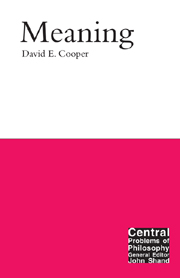7 - The meaning of life
Summary
The eponymous heroine of Michael Ondaatje's Anil's Ghost is disillusioned, no longer able to “believe that meaning allowed a person a door to escape grief and fear” (2000: 55). It is a belief, however, that most of us are reluctant to abandon. A typical response, after all, by those whom tragedy affects – the loss of a child, say – is to seek some “sense to it” that might redeem the event from sheer pointless contingency. It is not, of course, only in order to confront grief and fear that people seek meaning or sense in their intercourse with the world. Human beings are inveterately teleological beings: they are not, as I remarked in Chapter 6, merely “condemned” as beings-in-the-world to traffic with meanings, but always on the qui vive for further meanings that lend sense and point to their activities. Nietzsche only moderately exaggerates when observing that “if you have your why? for life, you can get along with almost any how?” (1954: maxim 12). It might indeed strike a visiting alien that it matters less to people how they spend their time than that, whatever this is, it is something that affords meaning, in their eyes, to their occupations.
It is unsurprising, in the light of this, that people proceed to ask questions, not about the significance of this or that activity or event, but about the significance of human life itself. Indeed, perhaps this procession is inevitable.
- Type
- Chapter
- Information
- Meaning , pp. 126 - 142Publisher: Acumen PublishingPrint publication year: 2003



